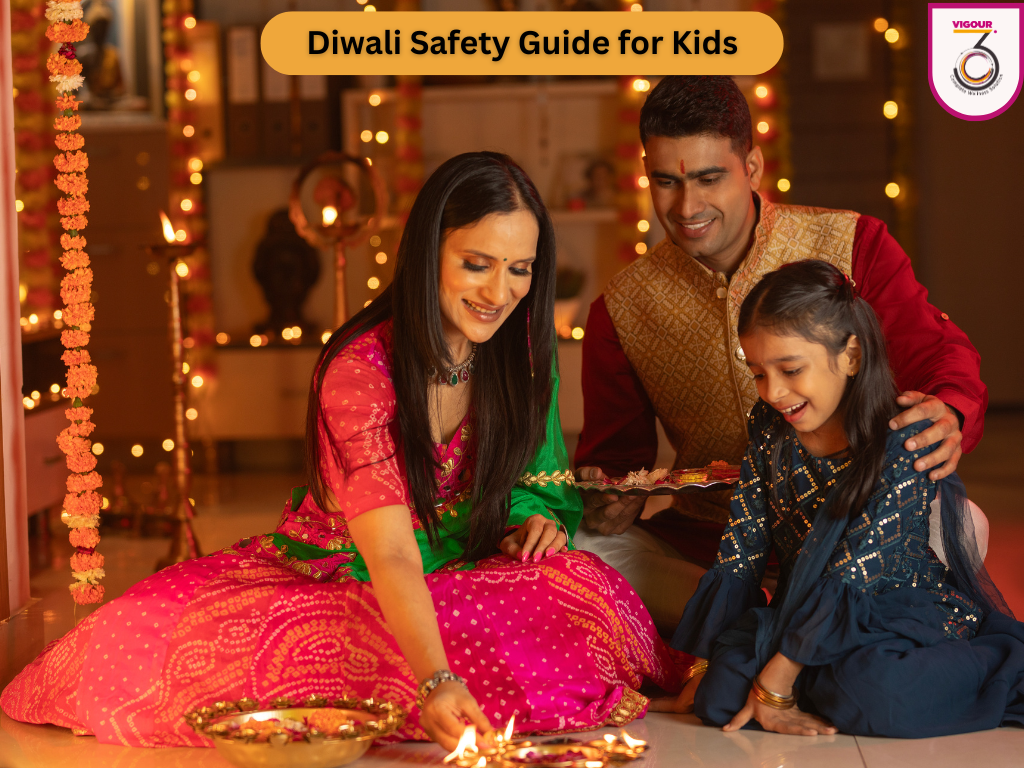
Diwali is a time of joy, lights, and celebration, but it can also pose risks for children. Every year, kids face burns, eye injuries, and respiratory problems from firecrackers and smoke. Understanding firecracker safety tips for children can help parents and families to prevent accidents and ensure a healthy, happy festival.
In this article, we share practical tips to keep your children safe, healthy, and stress-free while enjoying the festive season.
Children love the sparkle of Diwali, but their smaller size and developing senses make them more likely to get hurt if safety isn’t taken seriously. Here’s why they need extra care:
That’s why firecracker safety for children should always include adult supervision, safe distances, and a clean-air environment. Prevention is the best way to save children from burn and injuries.
Restrict direct handling: Children under 12 should not light fireworks, even sparklers, without very close supervision.
Always choose certified products: Use ISI-marked (or equivalent certified) firecrackers. Avoid broken items.
Designate a safe zone: Use open, ventilated areas away from dry leaves, vehicles, flammable materials, and crowds.
Maintain distance and support tools: Use long lighting sticks, don’t lean over crackers, and always keep a bucket of water/sand or fire extinguisher nearby.
Discard unexploded firecracker: Once a firecracker fails, leave it alone. Do not relight and discard it carefully.
1. Burns:
If your child gets a burn from a spark or cracker, immediately cool the area under running water for 10–15 minutes. Cover it with a clean gauze or a non-fluffy cloth to protect the skin. Avoid using toothpaste or other home remedies, as they can worsen the injury. Seek medical help if the burn is deep, large, near the face or joints, or shows blistering or pus.
2. Eye Injuries
For eye accidents, do not rub or flush the eye aggressively. Lightly cover it with a clean cloth and take the child to a specialist. Avoid trying to remove any embedded material yourself. Immediate medical attention is necessary if there is vision loss, persistent pain, or bleeding.
3. Noise or Blast Shock
Loud crackers can cause dizziness, nausea, ringing in the ears, or shock. Move your child to a quiet room and let them rest while monitoring for symptoms. Avoid exposing them to more loud sounds. See a doctor if there is persistent ringing, hearing loss, or ear pain.
4. Smoke Inhalation or Breathing Trouble
If your child inhales smoke, take them to fresh air immediately and keep them calm. Use their inhaler if prescribed. Avoid sudden physical exertion. Medical attention is needed if they experience wheezing, persistent cough, or chest pain.
While Diwali is a time for celebration, it also brings hidden health risks for children. Beyond obvious dangers like burns, parents should pay attention to air quality, noise, and diet to ensure a safe and healthy festival.
1. Protect Respiratory Health:
Firecracker smoke contains fine particulate matter that can irritate children’s lungs, especially those with asthma or respiratory conditions. To minimize risk:
2. Reduce Noise and Sensory Stress:
The loud blasts of fireworks can affect children’s hearing and cause stress, particularly for infants or those sensitive to sound. Preventive measures include:
3. Maintain Digestive Balance:
Festive indulgences can disrupt digestion, cause sugar spikes, or trigger discomfort. Support children’s digestive health with these tips:
Following these Diwali health tips for children helps protect their respiratory system, hearing, and digestion, creating a festival that is both fun and safe.
By following these Diwali safety tips for children — supervising firecrackers, protecting their respiratory health, managing noise exposure, and maintaining a balanced diet — parents and can ensure a safe, and happy celebration. Learn more.
Comments (0)